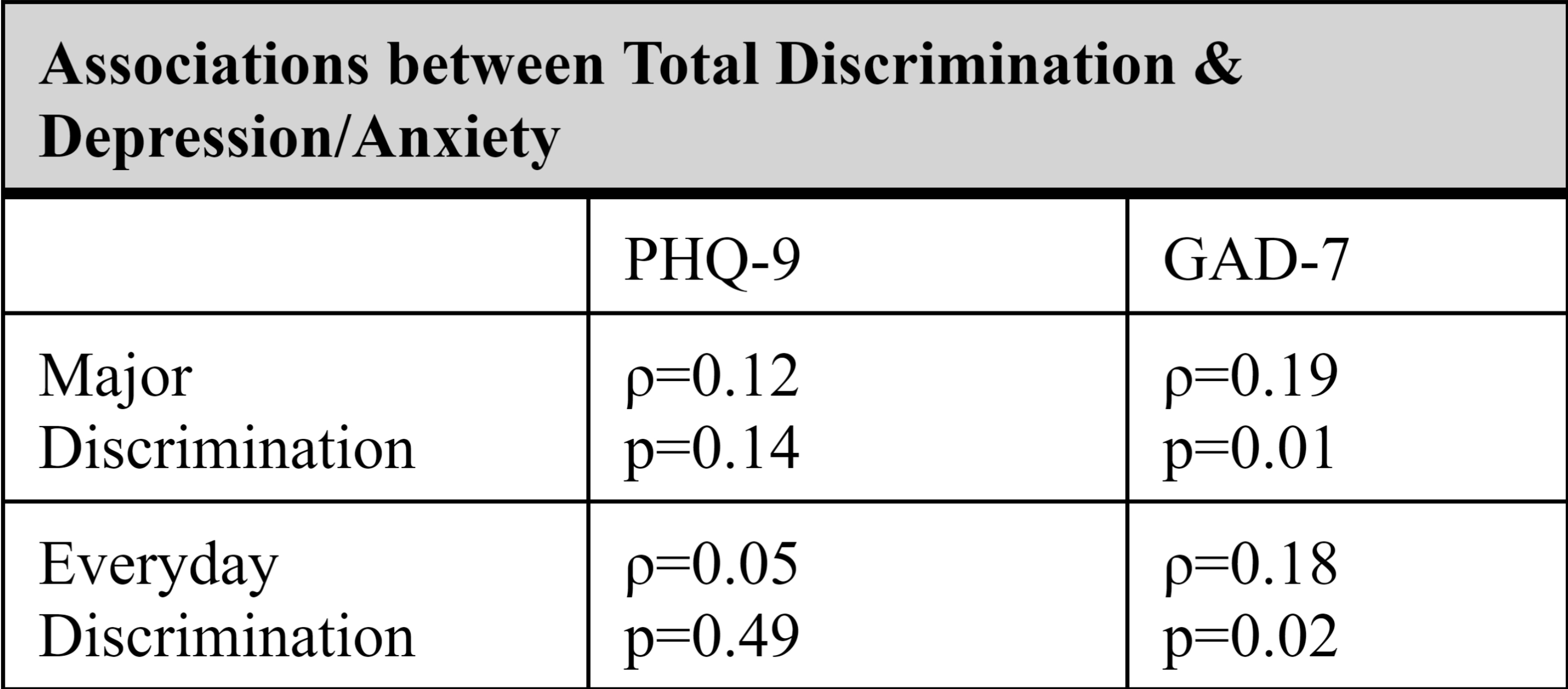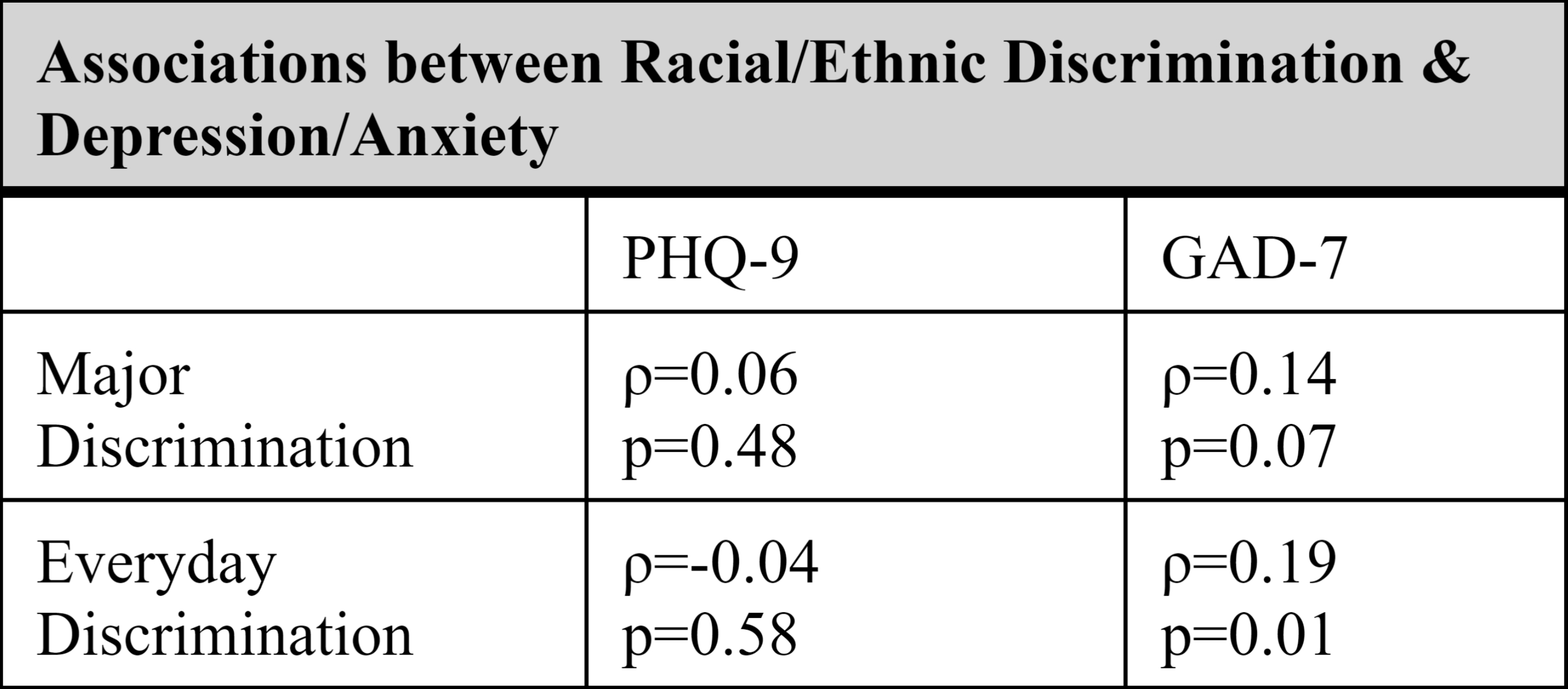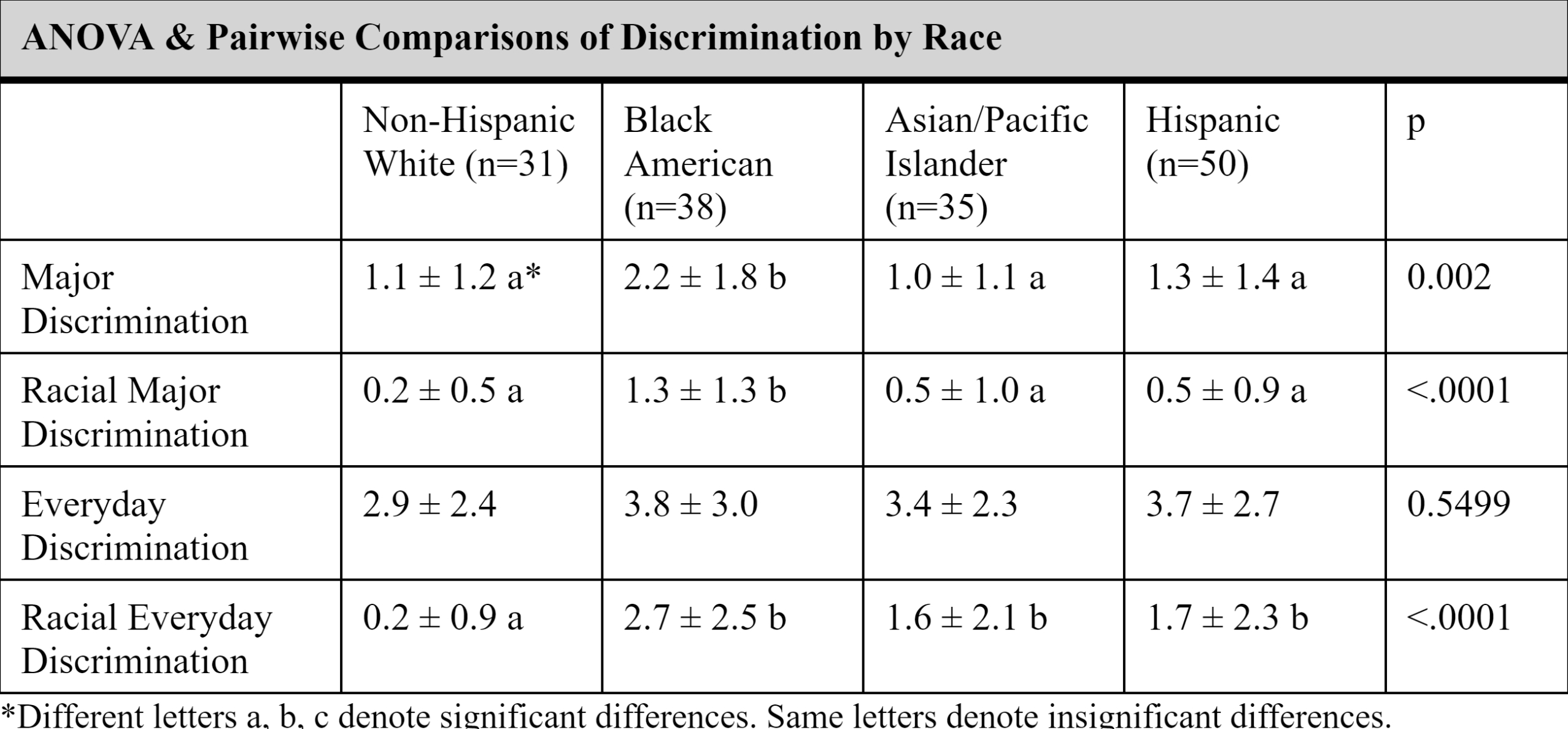Final ID: P3144
Association Between Perceived Discrimination and Depression/Anxiety Symptoms
Abstract Body: Introduction: Research linking perceived discrimination and depression and anxiety symptoms as well as brain function is limited.
Objective: To examine the relationship between perceived discrimination, particularly racial/ethnic discrimination, and depression and anxiety symptoms, as well as brain function related to emotion and cognition, in individuals with depression and/or anxiety. Differences by race and ethnicity were also explored.
Methods: We analyzed baseline data on perceived discrimination, depression and anxiety symptoms, and brain activities in an ongoing clinical trial, which investigates a voice-based virtual coach for problem-solving treatment. Perceived discrimination was measured using the PhenX Major Experiences and Everyday Discrimination Scales. Depression and anxiety were assessed using the PHQ-9 and GAD-7, respectively. Activity of a priori neural targets, amygdala for emotional reactivity and dorsolateral prefrontal cortex (dlPFC) for cognitive control, was measured using fMRI.
Results: Among 161 participants (mean age 36.6 [SD 11.8] years; 80.8% female; 19.3% Non-Hispanic White, 23.6% Black American, 21.7% AAPI, 31.1% Hispanic), major (r=0.14; p=.01) and everyday (r=0.19; p=.02) discrimination scores were significantly positively correlated with GAD-7 scores. Racial/ethnic discrimination was significantly positively associated with GAD-7 scores (r=.19; p=.01) when reported for everyday discrimination. The association was also positive but not statistically significant when reported for major discrimination (r=.14; p=.07). For differences by race/ethnicity, Black Americans reported the highest levels of both general (p=.002) and racial/ethnic major discrimination (p<.0001). Black Americans, AAPI, and Latinos reported significantly greater racial/ethnic everyday discrimination than non-Hispanic White participants (p<.0001).
Neither major or everyday discrimination correlated significantly with PHQ-9 scores or with the neural targets (dlPFC and amygdala).
Conclusion: Heightened anxiety but not depressive symptoms or the prespecified neural targets are associated with experiences of discrimination, particularly racial/ethnic discrimination, in adults with depression or anxiety. Research on how to address social determinants of health such as discrimination in mental health interventions is warranted.
Objective: To examine the relationship between perceived discrimination, particularly racial/ethnic discrimination, and depression and anxiety symptoms, as well as brain function related to emotion and cognition, in individuals with depression and/or anxiety. Differences by race and ethnicity were also explored.
Methods: We analyzed baseline data on perceived discrimination, depression and anxiety symptoms, and brain activities in an ongoing clinical trial, which investigates a voice-based virtual coach for problem-solving treatment. Perceived discrimination was measured using the PhenX Major Experiences and Everyday Discrimination Scales. Depression and anxiety were assessed using the PHQ-9 and GAD-7, respectively. Activity of a priori neural targets, amygdala for emotional reactivity and dorsolateral prefrontal cortex (dlPFC) for cognitive control, was measured using fMRI.
Results: Among 161 participants (mean age 36.6 [SD 11.8] years; 80.8% female; 19.3% Non-Hispanic White, 23.6% Black American, 21.7% AAPI, 31.1% Hispanic), major (r=0.14; p=.01) and everyday (r=0.19; p=.02) discrimination scores were significantly positively correlated with GAD-7 scores. Racial/ethnic discrimination was significantly positively associated with GAD-7 scores (r=.19; p=.01) when reported for everyday discrimination. The association was also positive but not statistically significant when reported for major discrimination (r=.14; p=.07). For differences by race/ethnicity, Black Americans reported the highest levels of both general (p=.002) and racial/ethnic major discrimination (p<.0001). Black Americans, AAPI, and Latinos reported significantly greater racial/ethnic everyday discrimination than non-Hispanic White participants (p<.0001).
Neither major or everyday discrimination correlated significantly with PHQ-9 scores or with the neural targets (dlPFC and amygdala).
Conclusion: Heightened anxiety but not depressive symptoms or the prespecified neural targets are associated with experiences of discrimination, particularly racial/ethnic discrimination, in adults with depression or anxiety. Research on how to address social determinants of health such as discrimination in mental health interventions is warranted.
More abstracts on this topic:
An Evaluation of Bystander CPR by Race, Accounting for Social Drivers of Health
Lane Nina, Crowe Remle, Salcido David
Flow diversion treatments for unruptured intracranial aneurysms: real-world perioperative outcomes, hospital readmissions, and impact of comorbid anxiety and mood disordersChen Huanwen, Khunte Mihir, Njonkou Tchoquessi Rosy Linda, Miller Tim, Cherian Jacob, Majmundar Shyam, Colasurdo Marco, Malhotra Ajay, Gandhi Dheeraj



